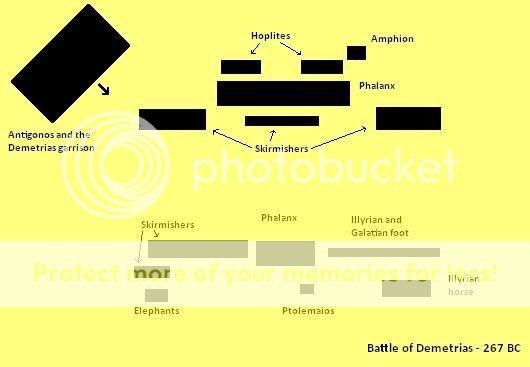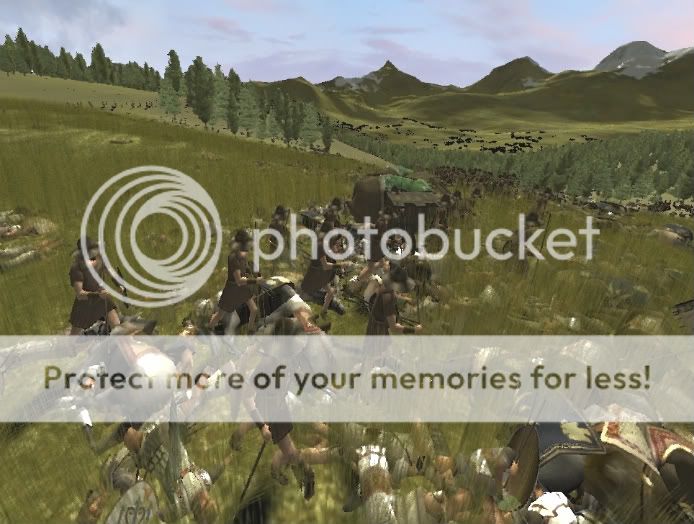Book IV, 4-6.
Background:
Ptolemaios must have known that, thanks to the taking of Athens in 268, the Antigonids could now focus all their resources at the retaking of Makedonia. It seems he wanted to launch a counter attack before the Antigonids had time to execute their plans.
However, the Antigonids moved faster than Ptolemaios and invaded Makedonia in the spring of 267, laying waste to much of the countryside and besieging the garrison left in Pella.
Ptolemaios, in the meantime, had marched through Thessalia, encountering little resistance, to Magnesia. There he set up camp some distance North from the Antigonid stronghold of Demetrias.
Spoiler Alert, click show to read:
The text:
[…]
After the messengers from Pella had reached Ptolemaios, he became eager to fight the battle and to return to relief Pella. Each day he deployed his troops for battle, but the old and cunning Antigonos Gonatas stayed behind his walls.
This he did not do because of cowardice, but because his garrison was slightly outnumbered and lacked heavy foot. Furthermore, he knew that the veterans from the battle of Athens were marching back to Demetrias.
[…]
Ptolemaios’ agents inside the town had been unable to open the gates. He did receive message that one brave man, whose name was Rhouphos Bouthrotios, had broken into the house of Hieronymos of Kardia[1], who was known to have close ties with Antigonos and had written propaganda against Pyrrhos, and taken the old man with him as a hostage to his hiding place.
[…]
Great clouds of dust showed up in the distance to the South. It were the veterans, 10000 seasoned fighters, marching under the command of one Amphion.
[…]
After the front screen of skirmishers had retreated to the back of the Antigonid army, the two battle lines slowly closed the gap between them. The two phalanx bodies pushed against each other while the hoplite infantry attacked the Illyrians and Celts. Meanwhile, on the other flank the skirmishing continued.
[…]
After that bold move, much of the army of Amphion was routing. This however caused great disorder in the part of the Epirote line that had been fighting in the woods, which was soon ambushed by the skirmishers who had retreated at the beginning of the battle. The Celts and the Illyrian horsemen were all slaughtered.
[…]
On the other flank Antigonos and his skirmishers had also reached the Epirotes. This was where the light horse and elephants had joined the battle against Amphion’s troops.
Antigonos led the charge in the proper Makedonian fashion; spear in hand, at the head of his Hetairoi. It is said that when Ptolemaios saw the old king pass a few passes away, he threw his Xyston at the king. It hit him in the eye and he was thrown from his horse, where he was trampled by his own men.
Oh the horror, oh the tragedy, the great man was no more. Antigonos II Gonatas was on his way to Hades.
Oh the horror, oh the tragedy, woe all those who indulge in the sin of Hubris, for they shall fall. Ptolemaios, who had always been rather full of himself, was ecstatic after his kill and plunged into the melee, now armed with only his sword.
It was only a short time later that also this great man was no more. Ptolemaios Aiakides, son of Pyrrhos king of Epeiros, was on his way to Hades.
[…]
The losses of human live were appalling. Of the 13700 Epirotes only 2800 were able to return to Epeiros through the mountains of Thessalia. Among the fallen were all of Pyrrhos’ precious elephants.
The Antigonids had suffered too. They had lost their king, seven thousand of the veterans under Amphion’s command were slaughtered and of the garrison of Demetrias 4000 men lay dead.
[…]
[1]Spoiler Alert, click show to read:
Spoiler Alert, click show to read:
Spoiler Alert, click show to read:







 --> -
--> - 
 Reply With Quote
Reply With Quote
Bookmarks